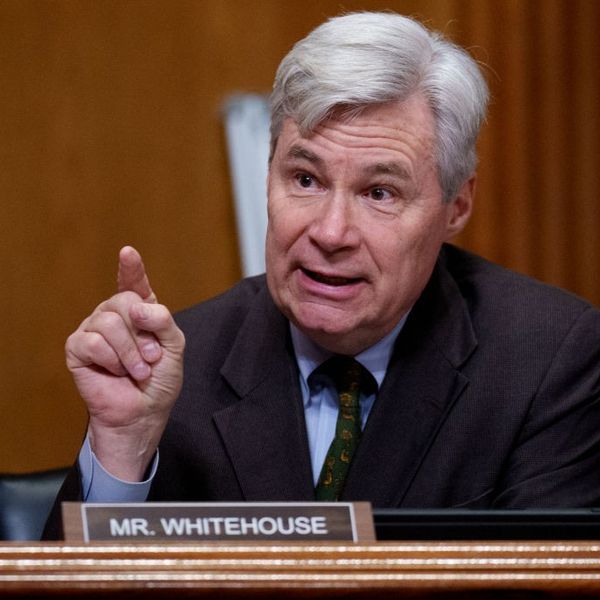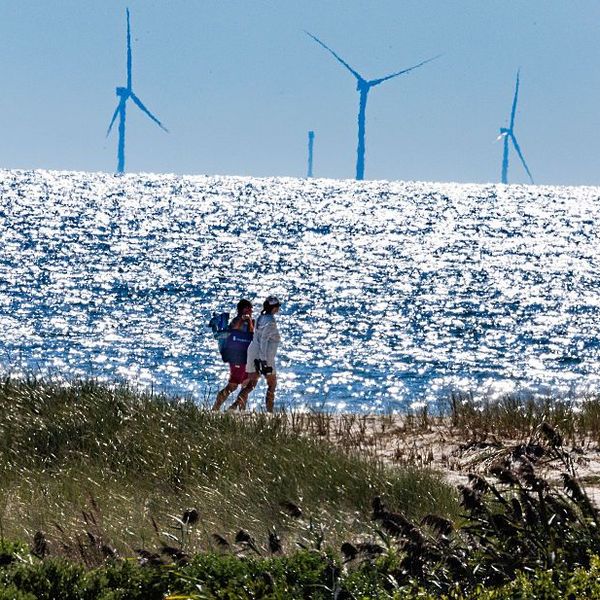Duke Energy Attempts to Block Citizens' Groups in Coal Ash Case
'Instead of cleaning up, what they’ve done is lawyer up'
Duke Energy is attempting to block citizens' groups from taking part in regulatory action against the company's 14 polluting coal ash dumps across North Carolina.
According to the Associated Press, Duke filed a motion on Monday to remove the citizens' groups from the case, arguing that the groups ought to be "prohibited from expanding this enforcement action beyond the claims asserted and relief sought by" the state environmental agency.
The energy giant is hoping to block local and environmental organizations from having "any role in the case," leaving litigation and enforcement to state regulators--who have a long history of giving preferential treatment to Duke.
"Duke fears that we would seek to strongly enforce the law against Duke's illegal coal ash pollution and dangerous storage on North Carolina rivers," said Frank Holleman, senior attorney at the Southern Environmental Law Center, in an interview with Common Dreams. "Well, they're right. That's exactly what we will do and what we have done."
As AP explains:
The state enforcement case began last year when the environmental law group, working on behalf of a coalition of citizens groups, tried to use the U.S. Clean Water Act to sue Duke in federal court over groundwater pollution leeching from its coal ash dumps.
The state environmental agency instead used its authority to issue violations and take the case to state court, quickly negotiating a settlement involving two plants that would have fined Duke $99,111 with no requirement that the $50 billion company clean up its pollution. The citizens groups protested, calling it a "sweetheart deal" intended to protect Duke from possibly harsher federal penalties.
Following the uproar over the February coal ash spill into the Dan River and amid the ongoing federal probe into the relationship between the utility and the N.C. Department of Environment and Natural Resources (DENR), the state agency asked a judge to dismiss the earlier settlement, saying it now intends to pursue enforcement through the court system. Citizens' groups have since intervened in the case.
"What Duke's CEO has been saying publicly is they accept responsibility," said Holleman. "But instead of cleaning up, what they've done is lawyer up. They have filed a legal document in court denying any legal liability whatsoever."
_____________________
An Urgent Message From Our Co-Founder
Dear Common Dreams reader, The U.S. is on a fast track to authoritarianism like nothing I've ever seen. Meanwhile, corporate news outlets are utterly capitulating to Trump, twisting their coverage to avoid drawing his ire while lining up to stuff cash in his pockets. That's why I believe that Common Dreams is doing the best and most consequential reporting that we've ever done. Our small but mighty team is a progressive reporting powerhouse, covering the news every day that the corporate media never will. Our mission has always been simple: To inform. To inspire. And to ignite change for the common good. Now here's the key piece that I want all our readers to understand: None of this would be possible without your financial support. That's not just some fundraising cliche. It's the absolute and literal truth. We don't accept corporate advertising and never will. We don't have a paywall because we don't think people should be blocked from critical news based on their ability to pay. Everything we do is funded by the donations of readers like you. Will you donate now to help power the nonprofit, independent reporting of Common Dreams? Thank you for being a vital member of our community. Together, we can keep independent journalism alive when it’s needed most. - Craig Brown, Co-founder |
Duke Energy is attempting to block citizens' groups from taking part in regulatory action against the company's 14 polluting coal ash dumps across North Carolina.
According to the Associated Press, Duke filed a motion on Monday to remove the citizens' groups from the case, arguing that the groups ought to be "prohibited from expanding this enforcement action beyond the claims asserted and relief sought by" the state environmental agency.
The energy giant is hoping to block local and environmental organizations from having "any role in the case," leaving litigation and enforcement to state regulators--who have a long history of giving preferential treatment to Duke.
"Duke fears that we would seek to strongly enforce the law against Duke's illegal coal ash pollution and dangerous storage on North Carolina rivers," said Frank Holleman, senior attorney at the Southern Environmental Law Center, in an interview with Common Dreams. "Well, they're right. That's exactly what we will do and what we have done."
As AP explains:
The state enforcement case began last year when the environmental law group, working on behalf of a coalition of citizens groups, tried to use the U.S. Clean Water Act to sue Duke in federal court over groundwater pollution leeching from its coal ash dumps.
The state environmental agency instead used its authority to issue violations and take the case to state court, quickly negotiating a settlement involving two plants that would have fined Duke $99,111 with no requirement that the $50 billion company clean up its pollution. The citizens groups protested, calling it a "sweetheart deal" intended to protect Duke from possibly harsher federal penalties.
Following the uproar over the February coal ash spill into the Dan River and amid the ongoing federal probe into the relationship between the utility and the N.C. Department of Environment and Natural Resources (DENR), the state agency asked a judge to dismiss the earlier settlement, saying it now intends to pursue enforcement through the court system. Citizens' groups have since intervened in the case.
"What Duke's CEO has been saying publicly is they accept responsibility," said Holleman. "But instead of cleaning up, what they've done is lawyer up. They have filed a legal document in court denying any legal liability whatsoever."
_____________________
Duke Energy is attempting to block citizens' groups from taking part in regulatory action against the company's 14 polluting coal ash dumps across North Carolina.
According to the Associated Press, Duke filed a motion on Monday to remove the citizens' groups from the case, arguing that the groups ought to be "prohibited from expanding this enforcement action beyond the claims asserted and relief sought by" the state environmental agency.
The energy giant is hoping to block local and environmental organizations from having "any role in the case," leaving litigation and enforcement to state regulators--who have a long history of giving preferential treatment to Duke.
"Duke fears that we would seek to strongly enforce the law against Duke's illegal coal ash pollution and dangerous storage on North Carolina rivers," said Frank Holleman, senior attorney at the Southern Environmental Law Center, in an interview with Common Dreams. "Well, they're right. That's exactly what we will do and what we have done."
As AP explains:
The state enforcement case began last year when the environmental law group, working on behalf of a coalition of citizens groups, tried to use the U.S. Clean Water Act to sue Duke in federal court over groundwater pollution leeching from its coal ash dumps.
The state environmental agency instead used its authority to issue violations and take the case to state court, quickly negotiating a settlement involving two plants that would have fined Duke $99,111 with no requirement that the $50 billion company clean up its pollution. The citizens groups protested, calling it a "sweetheart deal" intended to protect Duke from possibly harsher federal penalties.
Following the uproar over the February coal ash spill into the Dan River and amid the ongoing federal probe into the relationship between the utility and the N.C. Department of Environment and Natural Resources (DENR), the state agency asked a judge to dismiss the earlier settlement, saying it now intends to pursue enforcement through the court system. Citizens' groups have since intervened in the case.
"What Duke's CEO has been saying publicly is they accept responsibility," said Holleman. "But instead of cleaning up, what they've done is lawyer up. They have filed a legal document in court denying any legal liability whatsoever."
_____________________

